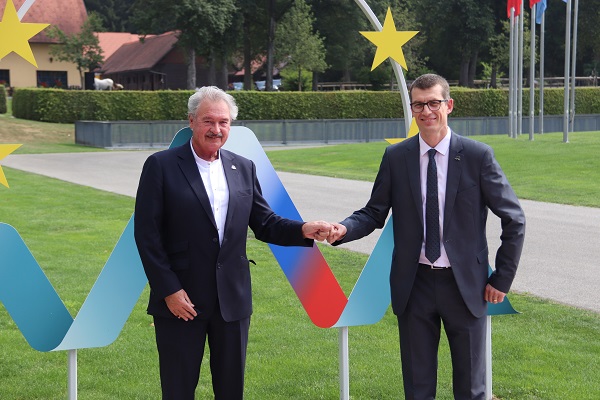 (L-R): Jean Asselborn, Minister of Foreign and European Affairs, Luxembourg; Anže Logar, Minister of Foreign Affairs of the Republic of Slovenia;
Credit: MAEE
(L-R): Jean Asselborn, Minister of Foreign and European Affairs, Luxembourg; Anže Logar, Minister of Foreign Affairs of the Republic of Slovenia;
Credit: MAEE
On Friday 23 July 2021, Luxembourg's Foreign and European Affairs Minister, Jean Asselborn, participated in the informal meeting of the European Union's General Affairs Council, which took place in Brdo pri Kranju in Slovenia.
The informal meeting allowed Minister Asselborn and his European counterparts to have an exchange of views on the priorities of the Slovenian Presidency of the Council of the European Union. The Minister stressed the importance of drawing the right lessons from the COVID-19 pandemic, in particular with regard to the question of how to avoid problematic situations at our internal borders in the future and to protect the mode of cross-border life led by 30% of the Union's population. In this context, he recalled that Luxembourg, together with its partners from the BeNeLux and the Baltic countries, put forward several proposals on this subject, including better consideration of cross-border realities in European Union decisions.
He also underlined the importance of the work of the European Commission on the recognition of 3G certificates from third countries, and expressed his hope that a coherent policy in this area could be reached quickly at the level of the 27 EU Member States.
In his speech, Minister Asselborn reiterated Luxembourg's support for the various initiatives underway to strengthen the rule of law in the European Union. He welcomed the recent publication by the European Commission of the rule of law country reports and called for swift implementation of the conditionality mechanism to protect the EU budget.
In terms of migration, the latest events at the border between Lithuania and Belarus illustrate, according to Minister Asselborn, how vulnerable the European Union is in the absence of a fair, robust and transparent system in the field of European migration. "The European Union must demonstrate its resilience in the face of these challenges and the status quo is no longer tenable," the minister said, insisting that "the work on solidarity cannot be put on hold".
The meeting was also an opportunity for the ministers in charge of European affairs to consider ways of strengthening the resilience of the EU after the crisis of the COVID-19 pandemic, in the presence of their counterparts from the partner countries of the Western Balkans. In this context, ministers had a discussion on issues related to the anticipation and prevention of crises, as well as coordination between sectors. The development of resilience, its monitoring as well as the reduction of dependencies were also mentioned in the context of this discussion.
Regarding the enlargement process, the Minister considered that “it is now up to the EU to keep its commitments in order to maintain its credibility as a reliable partner of the countries of the region” before continuing with a “compromise must be found so that accession negotiations with North Macedonia and Albania can finally be launched and so that intergovernmental conferences can be organised as soon as possible”.
Finally, on the side-lines of the informal meeting, Minister Asselborn was able to exchange bilaterally with his counterparts from Kosovo, Montenegro and North Macedonia. The exchanges provided an opportunity to discuss bilateral relations, the latest political developments in the Balkan region, issues related to EU enlargement as well as cooperation in the fight against the COVID-19 pandemic.








